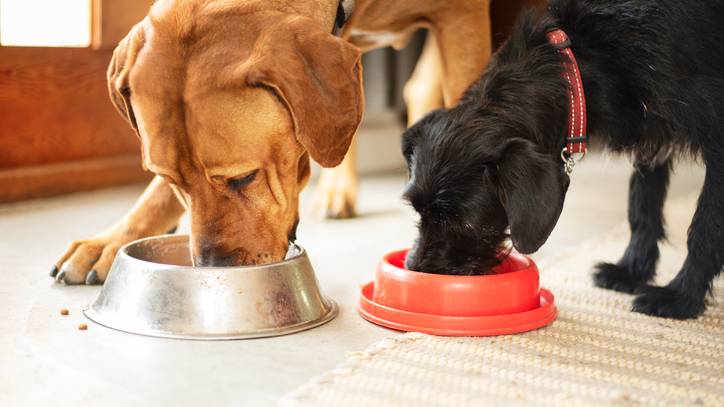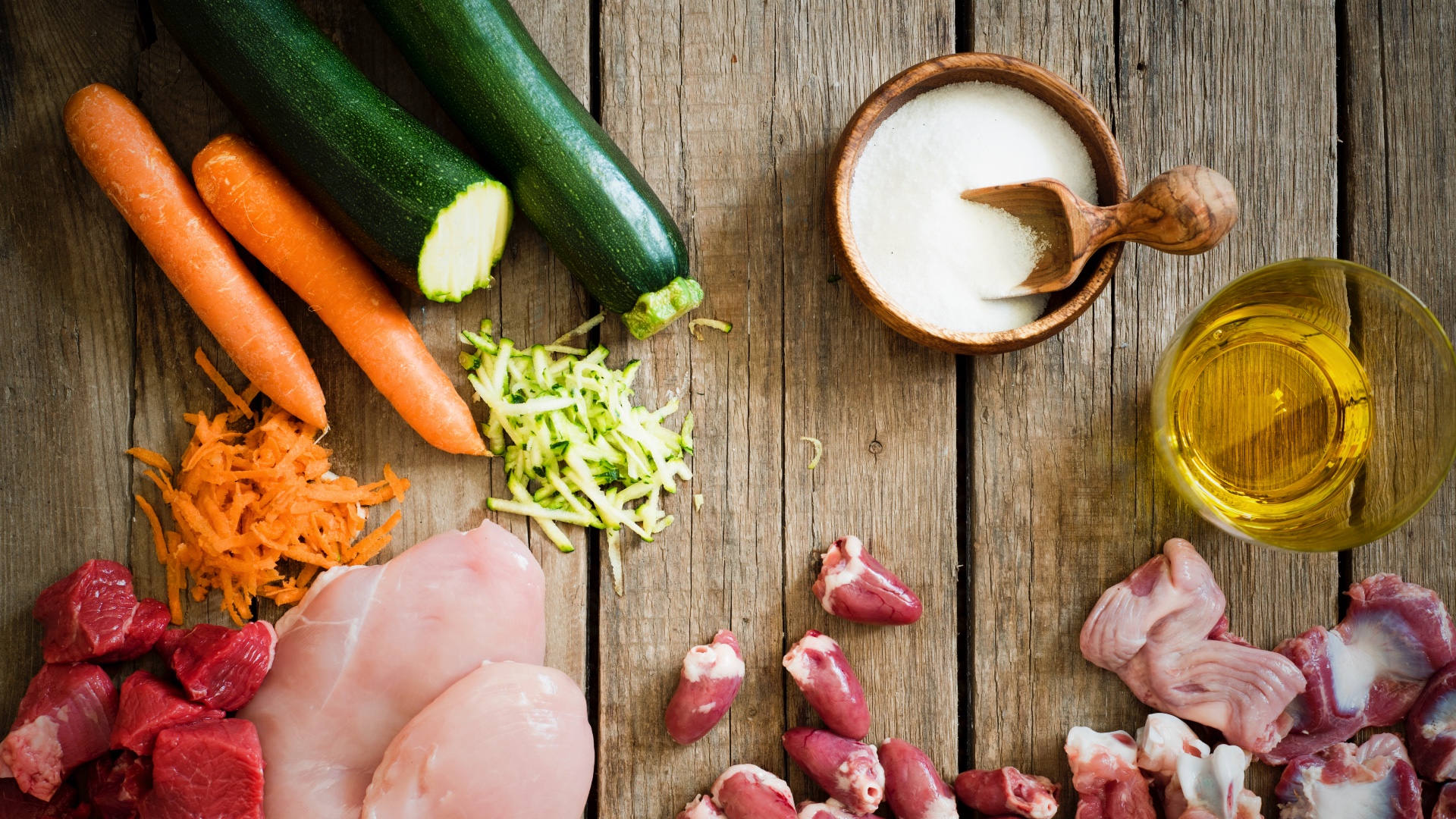What's the best diet for a diabetic dog? A vet's guide
Find out more about which diet is best for a diabetic dog, including which foods are best avoided

Get the best advice, tips and top tech for your beloved Pets
You are now subscribed
Your newsletter sign-up was successful
What's the best diet for a diabetic dog? If your pet has recently been diagnosed with diabetes it's common to ponder what to feed them in order to maintain their health. Although the treatment of diabetes mellitus in dogs predominantly relies on insulin therapy, a diet of the best diabetic dog food can have a significant impact on disease management.
Whether you're keen to learn more about which foods are best for your diabetic pup or you're wondering about the best diabetic dog treats, keep reading to learn more about which diet will work for your pooch.
- Hypoglycemia in dogs: A vet's guide
- Diabetes in dogs: a vet's guide
- Diabetes insipidus in dogs: a vet's guide
What is diabetes mellitus in dogs?
Before we dive into appropriate diets for diabetic dogs, it is important to understand what diabetes is. Diabetes mellitus in dogs is an endocrine disorder in which a lack of insulin production or insulin resistance results in hyperglycemia, or high blood glucose levels.
Most dogs are affected by insulin-dependent diabetes, which is similar to type 1 diabetes in humans. It occurs when the beta cells of the pancreas, which produce insulin, are destroyed, resulting in a deficiency of insulin.
There is no cure for diabetes in dogs, and diabetic dogs require lifelong insulin injections. No diet will eliminate the need for insulin therapy, but a suitable diet can help manage the condition.
What's the best food for a diabetic dog?
In short, there is no single best food for dogs with diabetes. The most important consideration when selecting a food for a diabetic dog is that they find it palatable and eat it consistently.
1. Consistent feeding
Most dogs with diabetes receive insulin injections every 12 hours. Ideally, a meal containing 50% of a dog’s daily energy requirement should be fed before each injection. However, some dogs may require additional small meals or treats between injections to prevent life-threatening hypoglycemic episodes.
Get the best advice, tips and top tech for your beloved Pets
Diabetic dogs’ insulin, food (including treats!), and exercise should be kept consistent from day to day to minimize abnormal fluctuations in blood glucose and keep their condition under control.
2. Veterinary prescription diet
There are a few veterinary therapeutic (“prescription”) diets on the market that have been formulated specifically for dogs with diabetes mellitus. They are often high in insoluble fiber, which slows digestion and the absorption of glucose into the bloodstream, preventing sudden spikes in blood glucose and subsequent hypoglycemia (i.e., low blood sugar).
These diets also tend to utilize complex carbohydrates over simple sugars for the same purpose. Veterinary therapeutic diets undergo more extensive testing than commercial diets, and their ingredients are more consistent between batches, which is beneficial in regulating blood sugar. Although they are a good choice for many dogs, they may not be appropriate for others.

Factors that determine a diabetic dog diet
Several factors can influence an individual dog’s ideal diet, including weight and co-existing diseases:
1. Weight
Whether a dog needs to gain, lose, or maintain weight can help determine which diet is best for them. Some newly diagnosed diabetic dogs may be underweight, so they should be fed a diet that will allow them to gain weight.
Overweight dogs, on the other hand, should be encouraged to lose weight. Although being overweight or obese does not increase the risk of diabetes in dogs, it can cause insulin resistance, making it more difficult to regulate diabetes once it has developed.
According to the 2018 American Hospital Association (AAHA) Diabetes Management Guidelines for Dogs and Cats, obese dogs should lose weight gradually (1-2% reduction per week).
Insulin requirements decrease when excess body fat is shed, so close monitoring is required in these dogs to avoid insulin overdose and hypoglycemic episodes, with the insulin dose adjusted as necessary according to your vet’s recommendation.
2. Medical history
There are some diseases that, when presenting alongside diabetes, can affect which diet should be fed.
For example, dogs with a history of pancreatitis or hyperlipidemia should be fed a low-fat diet, and dogs with heart disease should be given diets with a low sodium content. Other diseases that require consideration include chronic kidney disease and inflammatory bowel disease, among others.

What foods should dogs with diabetes avoid?
As we have discussed, the appropriate diet for a diabetic dog relies on many factors. There are some foods that should be avoided, however:
Foods that are high in simple sugars
Foods that are high in simple sugars, such as semi-moist foods, should be avoided because they cause surges in blood glucose after consumption. This can also happen with carbohydrate-rich treats and easily digestible diets (i.e., some “sensitive stomach” foods).
Fiber
Another ingredient to consider is fiber. Many veterinary therapeutic diets are high in fiber, which is often associated with lower calorie content. For this reason, some of these diets (and other high-fiber diets) are not suitable for underweight diabetic dogs. In dogs benefiting from high fiber content, high-fiber commercial diets should be used over fiber supplements.
Commercial diets are formulated to include all essential nutrients in the correct proportions, and added fiber can interfere with the absorption of these nutrients. In addition, some human fiber supplements contain sweeteners like xylitol, which is toxic to dogs.
Home-cooked diet
Lastly, home-cooked diets are not recommended for diabetic dogs because they can have a great amount of variability between batches and they do not undergo rigorous testing like commercial diets.
If an owner is adamant about feeding their diabetic dog a home-cooked diet, they should consult with a board-certified veterinary nutritionist before doing so.

Are eggs or chicken good for diabetic dogs?
Although eggs and chicken are good sources of protein with minimal carbohydrates, adding other foods or treats to a diabetic dog’s diet can affect how their normal food is absorbed and utilized, thus influencing their diabetic control.
Most commercial diets are complete and balanced, so the addition of these foods is unlikely to provide any benefit. If you wish to feed your diabetic dog eggs or chicken, this should be done in moderation and on a consistent basis (i.e., the same amount fed at the same time each day) under your vet’s supervision.
Changing your diabetic dog’s diet
Every diet will have a different effect on a dog’s diabetic control. If you decide to feed your diabetic dog a new food, it is very important to maintain contact with your veterinarian throughout the process so that they can monitor your pup’s blood glucose levels and adjust their insulin dose if required.
Dogs with well-managed diabetes should ideally be kept on the same diet unless their needs change. Your veterinarian can discuss your dog’s individual requirements with you and provide insight into which diet is best for them.
Dr. Diana Hasler graduated with distinction from the University of Edinburgh Royal (Dick) School of Veterinary Studies in 2018. She has experience working as a small animal veterinarian in general practice, where she has treated many dogs, cats, rabbits, and rodents. She has also recently branched out into the field of medical communications, doing freelance work as a medical editor and writer. Dr. Hasler has been Postdoctoral Research Fellow at Michigan Medicine since 2023, where she is a Laboratory Animal Medicine Resident.

